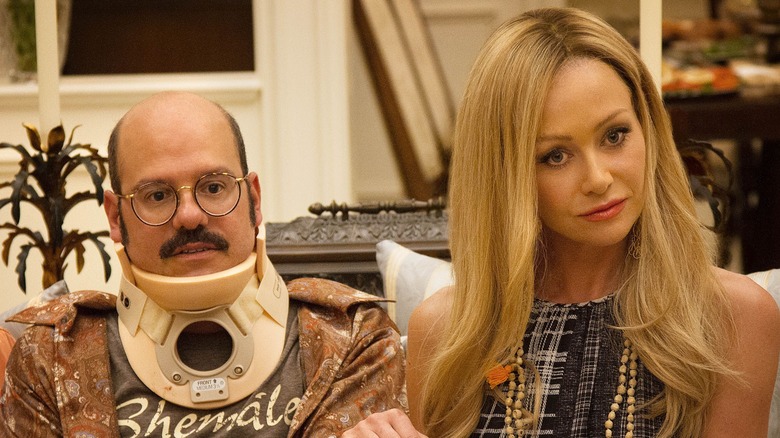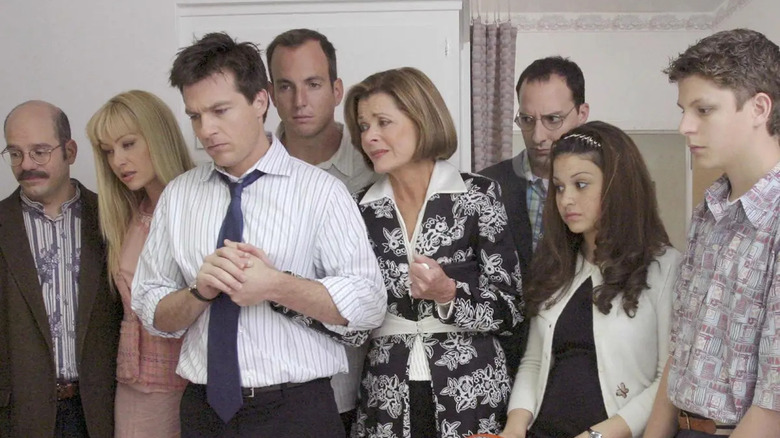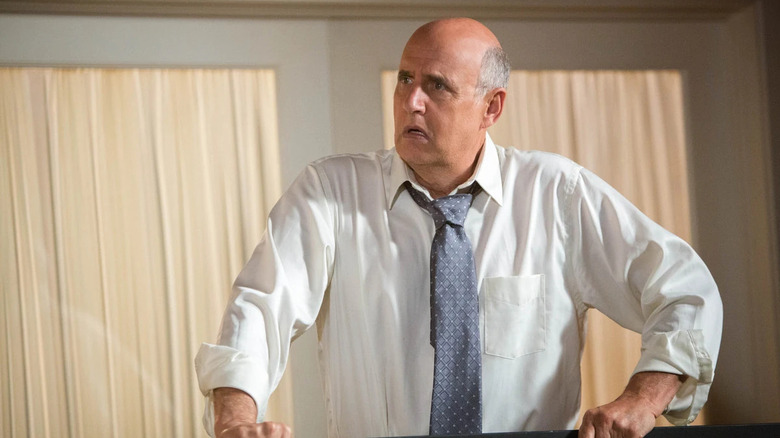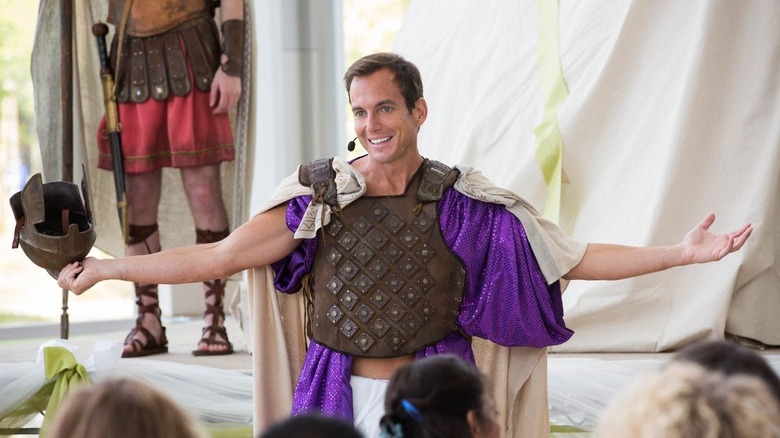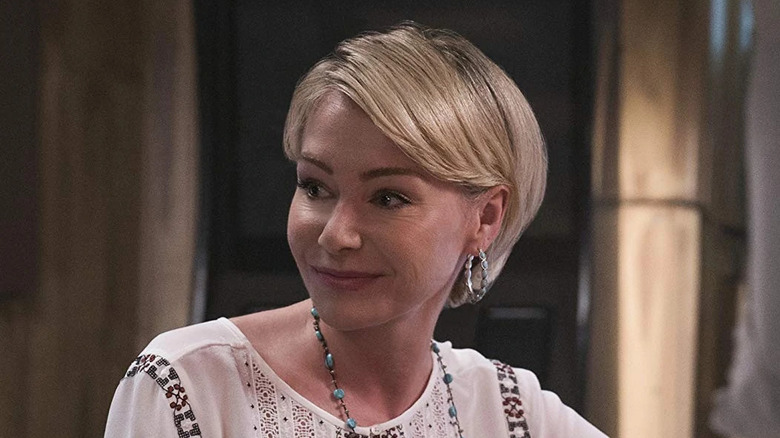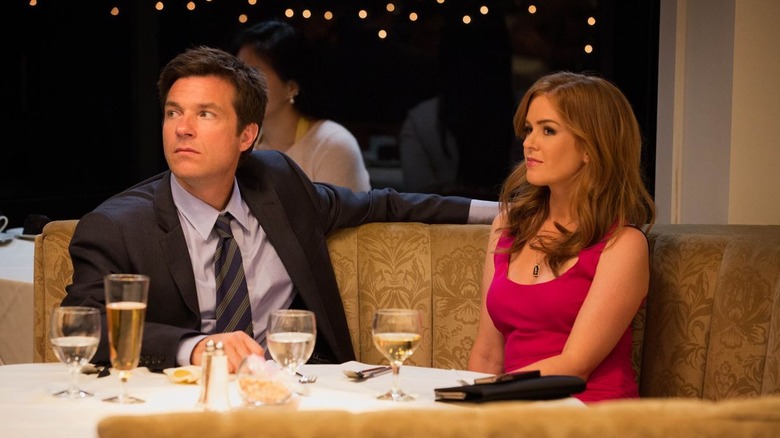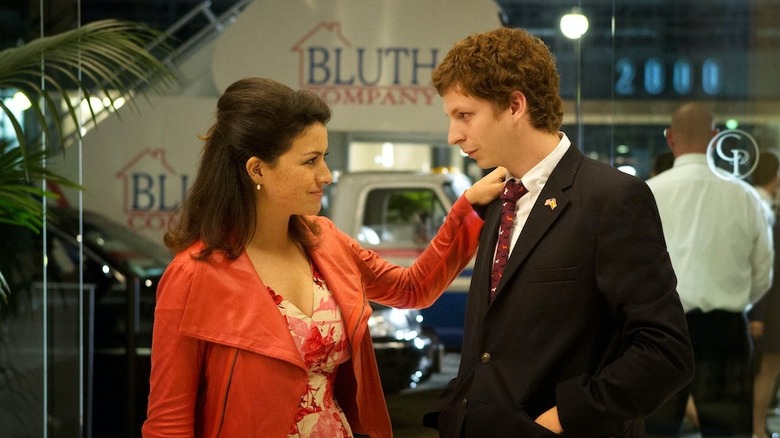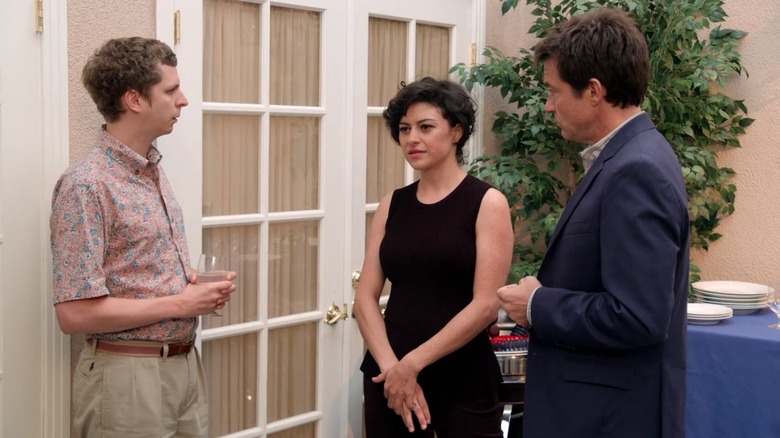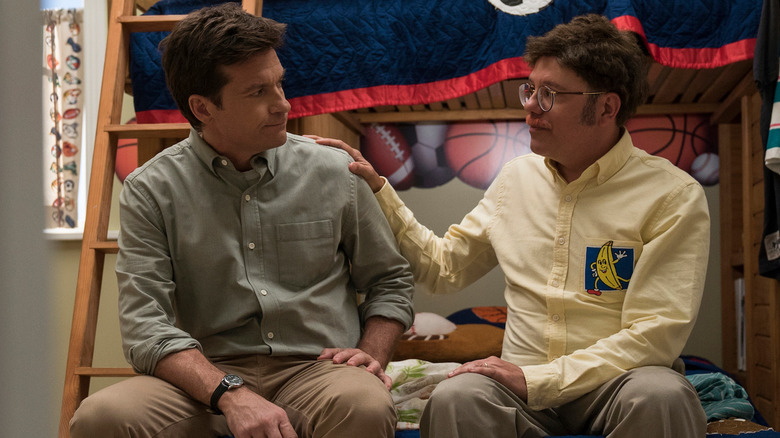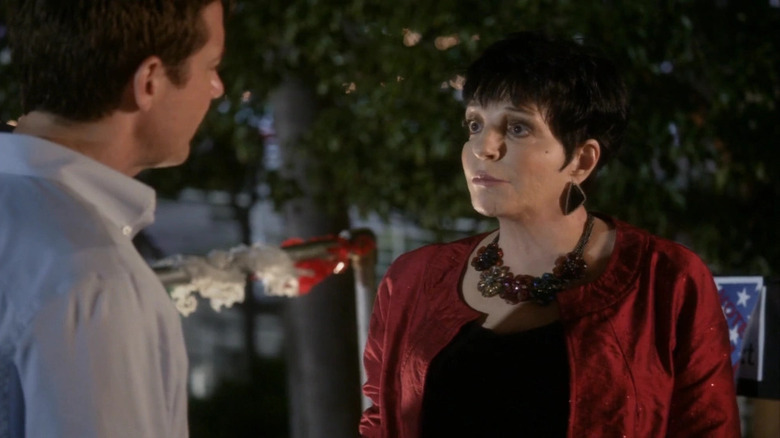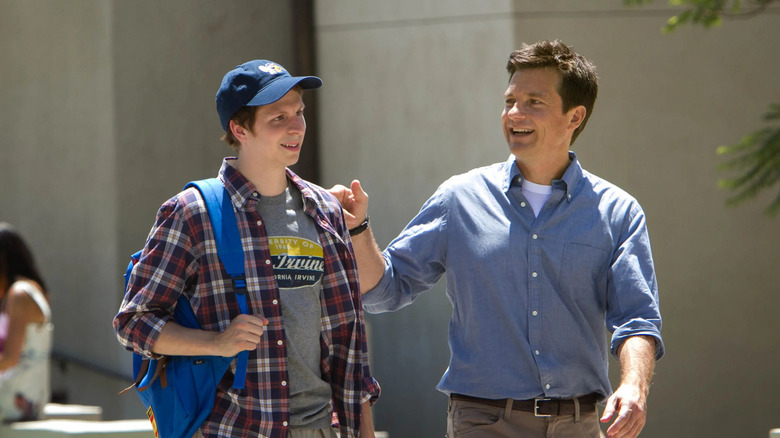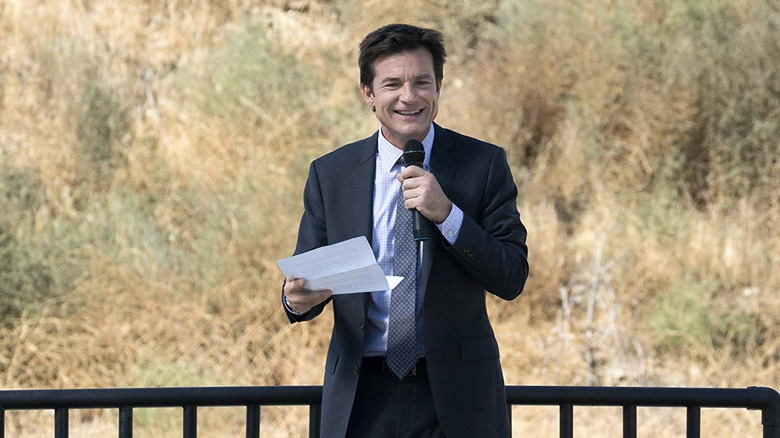Arrested Development: The 6 Best (And 6 Worst) Things About Netflix's Divisive Seasons
"Arrested Development" has often been referred to by both fans and critics alike as ahead of its time. The show first premiered on Fox in November of 2003, and was something of a rarity compared to other network sitcoms. It didn't feature many of the classic sitcom elements, such as a laugh track, and relied heavily on jokes and storylines that built steadily throughout the show's run. Often, if a viewer missed one of the many small details in "Arrested Development," they could end up lost. Over its three years on air, the show had a difficult time building a steady audience and was sadly canceled after its Season 3.
However, over time, the show became a huge cult classic. Many of the elements that made the show difficult for audiences to get into during its original run helped make it ideal for rewatches or binges on DVD and streaming. After the show's three seasons were added to Netflix, it began to build a new and devoted audience. So when Netflix announced it would be making new seasons of the show featuring the original cast, it seemed like a match made in heaven. Unfortunately, the new seasons of "Arrested Development" weren't exactly what many viewers hoped for. Still, Netflix's seasons had a lot going for them, so here are the best and worst things about Netflix's original seasons of "Arrested Development."
Best: Reuniting the show's legendary cast
One of the strongest qualities of "Arrested Development" is the incredible cast of actors that make up the Bluth family. Headlined by Jason Bateman, nearly every actor from the original cast went on to have a fantastic career after the show ended in 2006. The main cast itself included Will Arnett, Portia de Rossi, Tony Hale, Michael Cera, Alia Shawkat, Jessica Walter, David Cross, Jeffrey Tambor, and narrator Ron Howard. Let's not forget the many recurring guest stars, such as Liza Minnelli and Henry Winkler. With so many famous names on the roster, it seemed inconceivable that Netflix would be able to bring them all back, especially considering that many of them had built big movie careers and were no doubt very busy.
However, Netflix did just that. Not only did it secure every member of the Bluth family to make a return in its new seasons, but it also managed to bring back the majority of the original show's supporting characters for at least an appearance or two. Despite the seven-year gap between Season 3 and Season 4, the cast was just as strong as it ever was in Seasons 4 and 5, retaining the excellent chemistry and perfected comedic timing that made the show a cult hit in the first place.
Worst: Splitting up the cast during Season 4
While Netflix managed to secure the entire cast's return for Season 4, there was a notable downside. Due to the incredibly busy schedules of many main cast members, balancing when the actors were available to film turned out to be a difficult task. In order to get around this, "Arrested Development" experimented with a new format that involved separating characters' storylines and splitting them up into smaller groups. Usually, an episode has one or two of the leads mixed in with some of the supporting characters, and occasionally crosses paths with the other primary Bluths.
The new style was certainly intriguing, but unfortunately, it sacrifices one of "Arrested Developments" most successful features. Much of the show relies on not only the chemistry of the main cast in scenes together, but the relationships between them. Whether that's Michael's strained relationship with his father, Lindsay's attempts to prove herself worthy to her mother, or George Michael's crush on his cousin Maeby, these relationships helped make the otherwise absurd family relatable. That relatability dwindles with comparatively little screen time actually devoted to those family dynamics. Luckily, "Arrested Development" switches gears in Season 5, and for the most part, brings the cast back together.
Best: G.O.B.'s story in Season 4
With each member of the Bluth family mostly separated throughout the course of Season 4, it was inevitable that some of their stories would be stronger than others. Michael's older brother G.O.B. (short for George Oscar Bluth) is arguably one of the standouts, with an interesting story that actually evolves the character in meaningful ways while also catering to Will Arnett's over-the-top comedic talents. Out of the main members of the Bluth family, G.O.B. arguably has the least amount of character growth in the original seasons. As a self-absorbed magician and self-proclaimed womanizer, G.O.B. mainly serves as a rival to Michael, believing that as the older brother, he should be in charge of the Bluth Company.
In Season 4, G.O.B. marries his girlfriend Ann Veal (who used to be George Michael's girlfriend) after accidentally proposing to her. However, during the wedding, he sabotages a magic act and uses it to run away. Eventually, realizing that his rival Tony Wonder (Ben Stiller) has reignited his magic career by coming out as gay, G.O.B. decides to pretend that he is gay as well. In doing this, he begins to realize that he actually has real feelings for Tony, finally seeing someone as an equal and letting go of his ego just a bit. It's a great story that finally allows the character to grow into a more likable protagonist.
Worst: Sidelining Lindsay Bluth
Out of the main "Arrested Development" characters, Lindsay Bluth's story during the Netflix seasons is probably the most disappointing. A major character in the original three seasons, Lindsay's relationship with Michael is one of the most important in the show. The two grow up believing they're twins. Eventually, they find out that Lindsay is adopted and three years older than Michael, but their faux-sibling relationship is nevertheless a big part of their lives.
Sadly, this relationship never gets a chance to shine in Netflix's seasons of "Arrested Development." This is due, in large part, to actor Portia De Rossi's retirement from acting in 2018. In an interview with Entertainment Tonight, de Rossi revealed that she made the decision to retire prior to the filming of Season 5 but made an exception to return to "Arrested Development." However, because of her retirement, she only appears in six of the 15 episodes, with one of those episodes only featuring her in archival footage. While it is understandable that she was only able to return in a limited capacity, it's still a disappointment for many viewers to see the fan-favorite character sidelined, especially since her Season 4 storyline already feels too separated from the family's adventures.
Best: The clever recurring jokes
Many of the storylines in "Arrested Development" Seasons 4 and 5 may feel like a mess, but it's hard to deny that the show is still incredibly funny. Much like Seasons 1 through 3, Netflix's original seasons of "Arrested Development" rely heavily on clever and long-running jokes. The unique sense of humor on "Arrested Development" often involves setting up jokes that build slowly over time and occasionally don't pay out until several episodes, or even seasons, later.
This is the area where Seasons 4 and 5 really thrive. Not only do they continue many of the best running gags from the first few "Arrested Development" seasons, such as Ann Veal being referred to as "her?" or G.O.B. dancing to the song "The Final Countdown" by Europe before his magic act, but they also introduce some clever new jokes with delayed gratifications. Some examples include Tobias' motto "A New Start," which he turns into a license plate that unfortunately reads very differently than intended, or Lucille finding a new way to smoke while in her apartment by blowing the smoke into Buster's mouth. However, arguably the best gag was Michael Bluth's misunderstanding of George Michael's new program, Fakeblock, which changes the course of George Michael's story arc in Season 4.
Worst: The Season 4 re-edit
Season 4 is a very divisive season of "Arrested Development." While many fans praised the humor and the cast, others felt that the story and structure of the season weakened the sharp narrative that was present in the first three seasons. Because of this, it took five years before Netflix was able to shoot and release Season 5, as creator Mitch Hurwitz felt it was important for Season 5 to have the cast all together again, instead of separated like in Season 4. In addition, prior to the release of Season 5, Netflix and Mitch Hurwitz created a recut of Season 4 (along with new narration from Ron Howard) in an attempt to make the season feel more like its predecessors.
The storylines in the recut remain the same, but the new cut changes the way they're told. Instead of each episode focusing on a different member of the Bluth family, the recut splices the episodes together in chronological order and cuts out several scenes that aren't as important to the main narrative. While the recut is easier to follow and contains fewer prolonged absences of main characters, it ends up cutting out many of the season's best scenes, leaving out some important moments of character development or setups to jokes that pay off later, which makes for a less rewarding viewing experience.
Best: George Michael and Maeby's adult storylines
Many members of the Bluth family are left with disappointing storylines in Netflix's original seasons of "Arrested Development," but luckily, George Michael and his cousin Maeby are not among them. Now that the actors (and characters) are all grown up, the show gives them more interesting stories that evolve their characters in fun ways. George Michael, in particular, is given a lot to do in Season 4 and 5, but it's all thanks to Maeby that his story takes such an interesting turn.
When Season 4 begins, George Michael is attending college, and his father is living with him due to some era-specific difficulties surrounding the housing business. George Michael creates an app called Fakeblock, which is a simple app that simulates the sound of a wood block. However, because of a misunderstanding, his father and Maeby believe that the app is anti-piracy software. Naturally, Maeby creates an entire company around a software that doesn't exist. George Michael starts going by the name George Maharis and dating Rebel Alley, which puts him at odds with his father and creates a more interesting dynamic between the two.
Worst: Disjointed storytelling and themes
Seasons 4 and 5 of "Arrested Development" manage to recapture the humor and chemistry of the show's original run, but they drop the ball when it comes to storytelling. While the show's original run leans heavily into the Bluth family's over-the-top quirks and absurdist gags, at its core, "Arrested Development" is a surprisingly heartfelt and relatable show with extremely sharp writing. In addition to making audiences care for the Bluths in spite of their selfish ways, the show also sets up several carefully plotted storylines with surprising payouts.
Unfortunately, this is not the case in Netflix's seasons. While Season 4 manages to recapture the show's magic in some of its storylines, the separated cast and jumbled time order made the season hard to follow for some viewers. However, it's still considerably better than the show's Season 5, which tosses aside many of the most important "Arrested Development" themes. The early seasons of "Arrested Development" might have painted the Bluths as hard to like, but the show always emphasized the importance of fighting for family. Season 5 seems to focus only on the negative aspects of the Bluth family, making the show far less relatable.
Best: David Cross' performance
Out of the main cast of Bluth family characters, Tobias Fünke is always one of the most outlandish. During the course of the original three seasons, Tobias and his many quirks spawn some of the show's most popular and successful jokes and gags. Among these include the fact that he's a "Never Nude" and always wears jean cutoffs under his clothing and in the shower. Also, despite previously working as a psychotherapist, Tobias pursues an acting career, and often embodies many of the most ridiculous tropes surrounding unemployed actors.
In Season 4 and 5, Tobias' story only gets more absurd, which gives actor David Cross plenty of opportunities to flex his comedic talents. While every member of the Bluth family has their own specific recurring gags, Tobias' are often the most memorable thanks, in part, to Cross' excellent comedic timing and physical comedy. The entire cast of "Arrested Development" is fantastic in Netflix's seasons, but David Cross really stands out with many of his storylines. Tobias' attempt to stage an unlicensed Fantastic Four musical is particularly memorable.
Worst: The disappearance of Lucille Austero
One of the big overarching stories presented throughout both Seasons 4 and 5 of "Arrested Development" is the mystery surrounding the disappearance of Lucille Austero, often referred to by members of the Bluth family as Lucille 2. Much of Season 4 is spent building up the mystery of what happened during the fictional Cinco de Cuatro celebration in Newport Beach, which includes the disappearance and presumed murder of Lucille Austero. The season even takes its time developing possible motivations for each member of the Bluth family to, theoretically, kill Lucille 2. While Buster ends up being arrested for her murder at the end of Season 4, the mystery is left very open for further exploration in Season 5.
Unfortunately, Season 5 completely flubs what should have been a very interesting premise. Lucille 2's presumed murder is mainly used as a plotline just to give Buster something to do, with his trial making up the majority of his arc in Season 5. That said, "Arrested Development" is often known for playing the long game, and many fans were looking for small clues in hopes of a twist reveal — either that she faked her death, or another Bluth may have been responsible. However, the season finale revealed that the obvious choice was the correct one, and that Buster really did murder his ex-girlfriend and hid the body. The reveal is ultimately too dark and delivered with a throwaway blandness that's not worthy of the show's reputation for clever misdirects.
Best: Michael Bluth finally shows his true nature
"Arrested Development" focuses on telling the story of the Bluth family, who famously tend to be rich, spoiled, out of touch, and barely know how to take care of themselves. After the family patriarch George Bluth Sr. is arrested in the first episode of the show and the family's money gets tied up, the members of the Bluth family become even more needy than before, and their inability to function becomes the show's main focus.
However, there is one exception. Michael Bluth has separated himself from his family's shenanigans in many ways and sees himself as the one voice of reason in an otherwise unreasonable family. However, as the seasons progress, many viewers noticed that while Michael Bluth may be one of the family's more grounded members, he's still extremely selfish and wildly out of touch with those that don't share his money or social standing. Seasons 4 and 5 embrace this, showing that age has only made Michael more out of touch, and that his selfish parenting style has caused his son nothing but problems.
Worst: Season 5 is an unsatisfying conclusion
Whether it was initially intended to be this way, "Arrested Development" Season 5 ended up becoming the finale for the entire series. While the show never received an official cancellation, several factors — including Season 5's poor critical reviews, Jeffery Tambor's sexual misconduct scandals, and the passing of Jessica Walter — made an "Arrested Development" Season 6 very unlikely. With Netflix's announcement that the show, including Netflix's original seasons, will be leaving the streaming service on March 15, 2023, the show appears to have wrapped for good.
When the original "Arrested Development" was first canceled after Season 3, fans were treated to a finale that, while imperfect, is more or less a satisfying conclusion to the Bluth family saga. Even though the show was canceled before the producers wanted to end it, the writing had been on the wall and the show's writers managed to give the show a conclusion that wrapped the show's themes in a satisfying way. In contrast, Season 5's finale is a lackluster disappointment. The revelation that Buster is a murderer is a poor conclusion to the season-long mystery. In addition, the parallel endings of George Michael and Michael leaving the family feel more disingenuous than they do the first time around.
